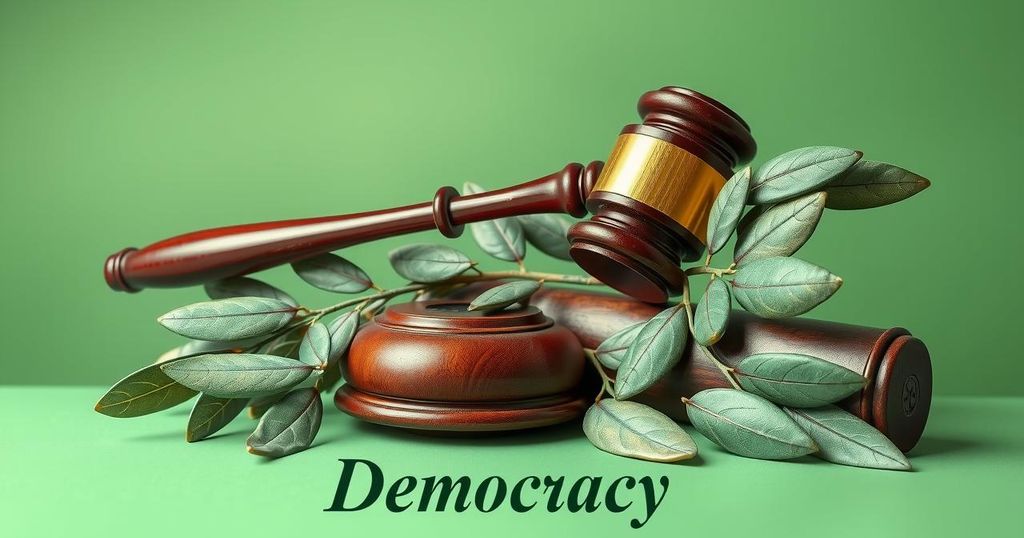Nigeria Yet to Fulfill Democratic Promise, Say Prominent Figures
At the recent June 12 National Dialogue in Lagos, prominent Nigerians, including Professor Pat Utomi and Dr. Wahab Shittu, discussed the ongoing struggle for democracy in Nigeria, lamenting the unfulfilled promises since the historic 1993 election. Shittu called for naming the INEC headquarters after MKO Abiola and urged the release of his family’s entitlements, while others emphasized the need for a people-driven constitution and accountability in governance.
On Thursday, prominent Nigerian figures lamented the slow progress towards achieving the promise of democracy, over three decades after the historic June 12, 1993 presidential election. Among those speaking at the annual June 12 National Dialogue in Lagos—hosted by the Eminent Patriots of Nigeria—was political economist Professor Pat Utomi, who emphasized the need for a reevaluation of the country’s democratic path.
Utomi projected optimism for Nigeria’s future but expressed concern about unfulfilled dreams, saying, “When we fought for democracy, we hoped that by now Nigeria would rank among the world’s top 10 nations. But look at where we are today. Is this the democracy some died for?” His statement struck a chord with attendees who understood the historical significance of the struggles faced in achieving democracy.
He articulated that the fight for democracy must continue unapologetically, despite significant challenges, urging Nigerians to persist in pushing for reform. “Nigerians must keep fighting to reclaim their freedom. If we die, we die. Nigeria will rise again,” he asserted emphatically, pushing for a renewed focus on democratic ideals.
Dr. Wahab Shittu, a senior advocate, echoed Utomi’s sentiments and called on President Bola Tinubu to honor the late Chief MKO Abiola by renaming the Independent National Electoral Commission (INEC) headquarters in Abuja to “MKO Abiola House.” Shittu argued this would highlight the significance of credible elections and serve as a reminder to leaders about their responsibilities.
Furthermore, Shittu urged the federal government to ensure that the entitlements owed to Abiola’s family are released, noting the ongoing pain inflicted by the annulment of the June 12, 1993 elections. He stated, “Abiola and his family were wronged by the annulment… The Federal Government should release all entitlements and monies due to Abiola’s family to correct this injustice.”
In his address, Shittu stressed the importance of a constitution that is representative of the Nigerian people, contrasting it with a military-imposed framework. “We have ‘cash-and-carry’ democracy; democracy by anointment… We need a people-driven, not military-imposed, constitution,” he noted, emphasizing the necessity for a democratic culture devoid of coercive influences.
Notable attendees included former Finance Minister Dr. Idika Kalu, who reminded citizens to appreciate Nigeria’s existence despite its challenges. “We must resist forces working against our national interest. United as one country, no foe can conquer Nigeria,” he urged.
In a contrasting viewpoint, Gboyega Adejumo argued that there was little to celebrate about June 12, describing it as a commemoration of corruption rather than actual progress. Meanwhile, Mike Omeri suggested that the day should symbolize the need for Nigeria to function as a true federation, advocating for resource pooling towards national advancement.
The reflections by various prominent Nigerians at the June 12 National Dialogue reveal a collective sense of disillusionment yet also a steadfast commitment to pursuing democratic ideals. The calls for reformation, recognition of MKO Abiola, and the need for accountability highlight the ongoing struggle for true democracy in the country. Discussions around a national identity and integrity of governance reflect a desire to reshape Nigeria’s narrative moving forward.
Original Source: punchng.com




Post Comment